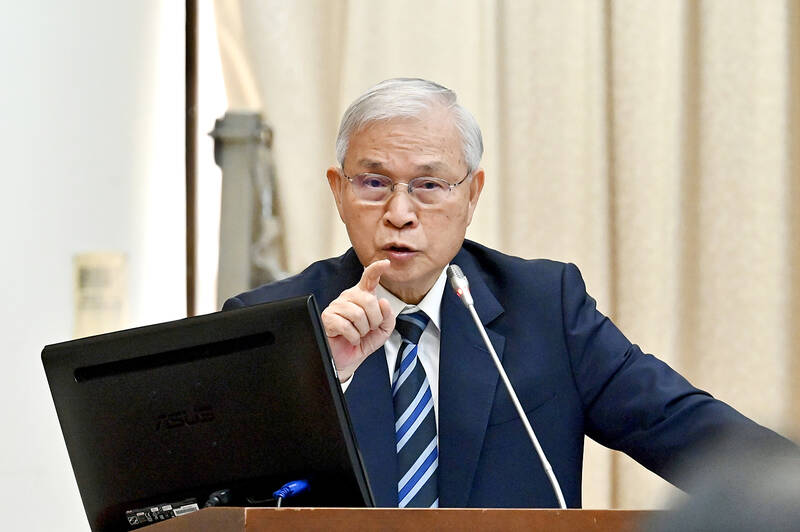Central bank Governor Yang Chin-long (楊金龍) yesterday dismissed the possibility of Taiwan being labeled a currency manipulator by the US Department of the Treasury.
“I’m confident that Taiwan will not be labeled as a currency manipulator,” Yang said at a meeting of the legislature’s Finance Committee in Taipei.
Taiwan’s foreign exchange interventions did not exceed the 2 percent of GDP criteria set by the US, he said.

Photo: George Tsorng, Taipei Times
Yang’s comments come as the New Taiwan dollar stabilized following its biggest two-day gain since the 1980s. The rally halted after Yang urged market commentators on Monday to stop speculating on the foreign exchange market.
The NT dollar had surged as exporters rushed to sell the greenback, partly on expectations that authorities would allow it to strengthen to help reach a trade deal with the US. The advance might have been exacerbated by life insurers — among Asia’s biggest holders of US debt — seeking to hedge those holdings, which make up the bulk of their more than NT$23 trillion (US$759 billion) of foreign assets.
The US did not ask for a stronger NT dollar and “overly strong” market expectations were driving the local currency, Yang said, adding that comments by his South Korean counterpart acknowledging US pressure on Asian currencies were poorly translated.
Yang said that based on his understanding, the Chung-Hua Institution for Economic Research and the Korean Peninsula News Platform (a Chinese-language Facebook page that covers Korean-language news) have said there were “discrepancies” in the translation of Bank of Korea Governor Rhee Chang-yong’s remarks.
Yonhap News Agency said that Rhee told reporters on Tuesday that Asian currencies, including the won, “have been gaining ground partly due to the US administration’s pressure on Asian countries to appreciate their currency.”
The rise was also partly due to expectations that the US and China would resume trade talks, the report cited Rhee as saying, adding: “We are not sure whether what the US really wants is a strong dollar or weak dollar.”
Yang yesterday said NT dollar strength has little impact on the economy, citing previous instances when the currency climbed to NT$30 per US dollar.
“But the central bank has learned a lesson from this. When you see sparks, you have to move quickly to put them out,” he said.
Following the recent volatility, market expectations that the NT dollar would rise further have eased, and a more stable equilibrium between supply and demand for the currency has prevailed, he added.
The NT dollar yesterday fell 0.03 percent to close at NT$30.303 against the US dollar in Taipei trading.
“Clearly there’s a lot of pressure on the CBC [Central Bank of the Republic of China] given the recent volatility,” ING Bank NV chief Greater China economist Lynn Song (宋林) said. “The takeaway is that the CBC will likely continue efforts to prevent speculation from causing high volatility, but it also is not the sole decider of the currency trajectory given market forces.”
“If we do see a weaker dollar environment persist, further strengthening of the Taiwan dollar can’t be ruled out,” Song said.
Additional reporting by CNA

Taiwan Semiconductor Manufacturing Co (TSMC, 台積電) last week recorded an increase in the number of shareholders to the highest in almost eight months, despite its share price falling 3.38 percent from the previous week, Taiwan Stock Exchange data released on Saturday showed. As of Friday, TSMC had 1.88 million shareholders, the most since the week of April 25 and an increase of 31,870 from the previous week, the data showed. The number of shareholders jumped despite a drop of NT$50 (US$1.59), or 3.38 percent, in TSMC’s share price from a week earlier to NT$1,430, as investors took profits from their earlier gains

In a high-security Shenzhen laboratory, Chinese scientists have built what Washington has spent years trying to prevent: a prototype of a machine capable of producing the cutting-edge semiconductor chips that power artificial intelligence (AI), smartphones and weapons central to Western military dominance, Reuters has learned. Completed early this year and undergoing testing, the prototype fills nearly an entire factory floor. It was built by a team of former engineers from Dutch semiconductor giant ASML who reverse-engineered the company’s extreme ultraviolet lithography (EUV) machines, according to two people with knowledge of the project. EUV machines sit at the heart of a technological Cold

Taiwan’s long-term economic competitiveness will hinge not only on national champions like Taiwan Semiconductor Manufacturing Co. (TSMC, 台積電) but also on the widespread adoption of artificial intelligence (AI) and other emerging technologies, a US-based scholar has said. At a lecture in Taipei on Tuesday, Jeffrey Ding, assistant professor of political science at the George Washington University and author of "Technology and the Rise of Great Powers," argued that historical experience shows that general-purpose technologies (GPTs) — such as electricity, computers and now AI — shape long-term economic advantages through their diffusion across the broader economy. "What really matters is not who pioneers

TAIWAN VALUE CHAIN: Foxtron is to fully own Luxgen following the transaction and it plans to launch a new electric model, the Foxtron Bria, in Taiwan next year Yulon Motor Co (裕隆汽車) yesterday said that its board of directors approved the disposal of its electric vehicle (EV) unit, Luxgen Motor Co (納智捷汽車), to Foxtron Vehicle Technologies Co (鴻華先進) for NT$787.6 million (US$24.98 million). Foxtron, a half-half joint venture between Yulon affiliate Hua-Chuang Automobile Information Technical Center Co (華創車電) and Hon Hai Precision Industry Co (鴻海精密), expects to wrap up the deal in the first quarter of next year. Foxtron would fully own Luxgen following the transaction, including five car distributing companies, outlets and all employees. The deal is subject to the approval of the Fair Trade Commission, Foxtron said. “Foxtron will be